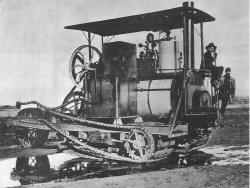Slow Moving Vehicle (SMV) Emblem Makes Significant Contributions To Agricultural And Highway Safety Worldwide. 1961- 63 Developed By Kenneth A. Harkness, Department Of Agricultural Engineering On The Ohio State University Campus. 1964 Became An ASAE Standard 1968 Specified In National Uniform Vehicle Code 1971 First Asabe Standard Ratified By American National Standards Institute (ANSI). Became Occupation Safety And Health Act (OSHA) Regulation. Ohio Farm And Home Safety Committee Provided Leadership
In Achieving Acceptance Dedicated 1992
Vehicles

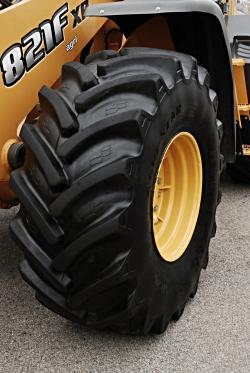
Early tractors were massive and expensive. Their steel lug wheels gave poor traction and a rough ride. Lugs were prohibited on many roads. 1926 Hoyle Pounds modified a Fordson tractor with zero pressure truck tires on special rims to improve performance on sandy soils in Winter Garden, FL.
A successful business resulted. In 1929 Hessel Roorda equipped Farmall tractors with low pressure rubber tires to pick corn in muddy fields near Rock Valley, IA. Farmers found they performed well in all conditions.
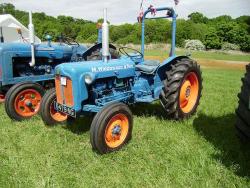
The First Agricultural Tractor Roll-Over Protection Structure (Rops) In The USA Resulted From Research By Lloyd H. Lamouria, Ralph R. Parks And Coby Lorensen At The Agricultural Engineering Department Of The University Of California At Davis. It Was Designed And Successfully Tested In The Summer Of 1956. It Was Exhibited And Reported At The Annual Meeting Of The Pacific Coast Section Of The American Society Of Agricultural Engineers (ASAE) In December 1956. Warren I. Hanson, Safety Coordinator, N.
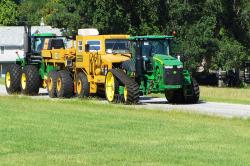
The First Official Nebraska Tractor Test was Started in this Building March 31, 1920. These Pioneer Tests Became Worldwide Standards and are Recognized by The American Society of Agricultural Engineers as an Historic Landmark of Agricultural Engineering. 1980
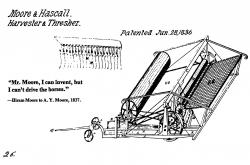
A Historic Landmark of Agricultural Engineering in 1834 Near the Village of Climax, Michigan, Hiram Moore and John Hascall Built and Put Into Practical Use the First Successful Grain Combined Harvester - Thresher Which was Patented June 28, 1836. This Achievement was a Significant Contribution to the Development of American Agriculture Dedicated by the American Society of Agricultural Engineers 1978

In 1892, John H. Froehlich, Froehlich, IA, Mounted A Gasoline Fueled Internal Combustion Engine On A Traction Geared Frame And Used It To Power A Threshing Machine. A Change In Power Source Had Begun On North American Farms. In 1892, The Case Co., Racine, Wi, Built An Experimental Gas Traction Engine. In 1898 A Patent Was Issued To The Van Duzen Co. Cincinnati, OH, For A Gasoline Traction Engine. Huber Mnfg., Marion, Oh, Bought This Patent In 1898 And Produced 30 Prototype Units. In 1902, Hart-Parr, Founded By Charles W. Hart And Charles H.
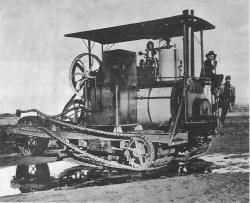
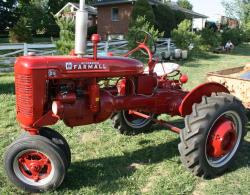
The First Successful Row Crop Tractor Invented by Bert R. Benjamin (ASAE Member) was Operated and Tested on this Farm in 1923. Increased Row Crop Clearance and Overall Versatility Extending the Use of the Tractor to Cultivating, Accelerated the Conversion from Animal Power to Machine and Marked a New Era in American Agricultural Efficiency and Productivity. Dedicated by The American Society of Agricultural Engineers 1980
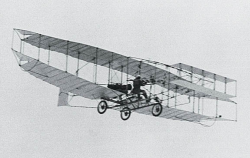
AIAA designated Baddeck, Nova Scotia as a historic site, providing a plaque to commemorate the centennial of the first powered flight in Canada. On February 23, 1909, piloting the “Silver Dart,” J.A. Douglas McCurdy took off from the frozen surface of Bras d’Or Lake at Baddeck Bay, and flew for close to one kilometer before landing safely on ice. The plane had been created by Mabel and Alexander Graham Bell’s Aerial Experiment Association, formed in 1907 to build and fly experimental aircraft.
Innovations
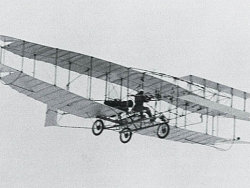
AIAA designated Baddeck, Nova Scotia as a historic site, providing a plaque to commemorate the centennial of the first powered flight in Canada. On February 23, 1909, piloting the “Silver Dart,” J.A. Douglas McCurdy took off from the frozen surface of Bras d’Or Lake at Baddeck Bay, and flew for…
Read More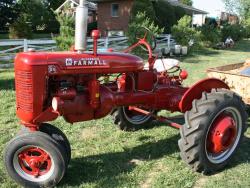
The First Successful Row Crop Tractor Invented by Bert R. Benjamin (ASAE Member) was Operated and Tested on this Farm in 1923. Increased Row Crop Clearance and Overall Versatility Extending the Use of the Tractor to Cultivating, Accelerated the Conversion from Animal Power to Machine…
Read More
In 1892, John H. Froehlich, Froehlich, IA, Mounted A Gasoline Fueled Internal Combustion Engine On A Traction Geared Frame And Used It To Power A Threshing Machine. A Change In Power Source Had Begun On North American Farms. In 1892, The Case Co., Racine, Wi, Built An Experimental Gas…
Read More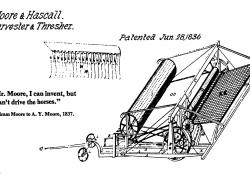
A Historic Landmark of Agricultural Engineering in 1834 Near the Village of Climax, Michigan, Hiram Moore and John Hascall Built and Put Into Practical Use the First Successful Grain Combined Harvester - Thresher Which was Patented June 28, 1836. This Achievement was a Significant…
Read More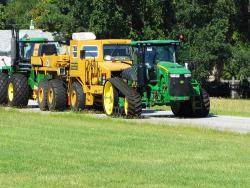
The First Official Nebraska Tractor Test was Started in this Building March 31, 1920. These Pioneer Tests Became Worldwide Standards and are Recognized by The American Society of Agricultural Engineers as an Historic Landmark of Agricultural Engineering. 1980
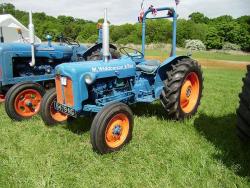
The First Agricultural Tractor Roll-Over Protection Structure (Rops) In The USA Resulted From Research By Lloyd H. Lamouria, Ralph R. Parks And Coby Lorensen At The Agricultural Engineering Department Of The University Of California At Davis. It Was Designed And Successfully Tested In The…
Read More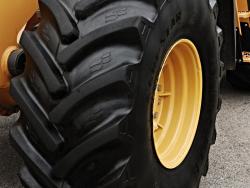
Early tractors were massive and expensive. Their steel lug wheels gave poor traction and a rough ride. Lugs were prohibited on many roads. 1926 Hoyle Pounds modified a Fordson tractor with zero pressure truck tires on special rims to improve performance on sandy soils in Winter…
Read More
Slow Moving Vehicle (SMV) Emblem Makes Significant Contributions To Agricultural And Highway Safety Worldwide. 1961- 63 Developed By Kenneth A. Harkness, Department Of Agricultural Engineering On The Ohio State University Campus. 1964 Became An ASAE Standard 1968 Specified In National…
Read More

